Every Corner Tells a Story: The Old Town...
Without noise or concrete, the Old...
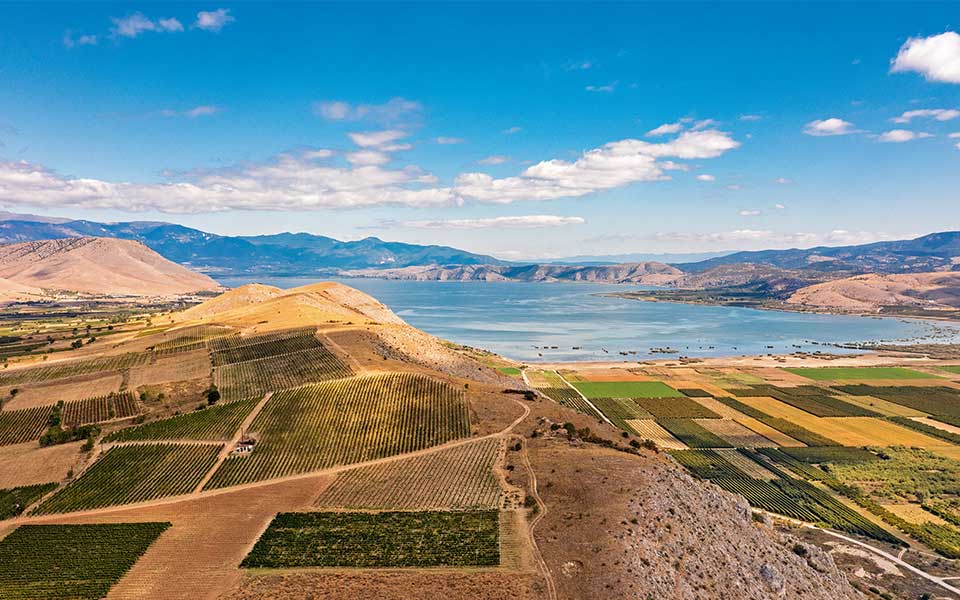
The four lakes of the Amyntaio Plateau contribute to the perfect microclimate for growing grapes.
© Konstantinos Tsakalidis
One hundred and sixty kilometers west of Thessaloniki, the Amyntaio plateau is surrounded by the imposing mountains of Vermio, Vitsi and Kaimaktsalan. The plateau is composed of mountainous landmasses and two lakes, Vegoritida and Petron, offering the ideal terroir for wine grape cultivation. With dry summers and sandy terrain above a limestone layer, the region’s climate and geography are ideal for vineyards. In fact, the entire plateau was once a lake. This particular region, which reaches a maximum altitude of 750 meters, was declared the Protected Designation of Origin (PDO) Amyntaio zone in 1972. It produces rosé, red and sparkling wines comprised of Xinomavro, a red grape variety that usually yield wines with high acidity, plenty of tannins and the potential for aging. The wine- producing region includes nine wineries with a total of 22 PDO labels. It’s also the largest producer of sparkling wines in the country, and can boast of having preserved some of the oldest Greek grapevines, over 100 years old and unaffected by phylloxera.
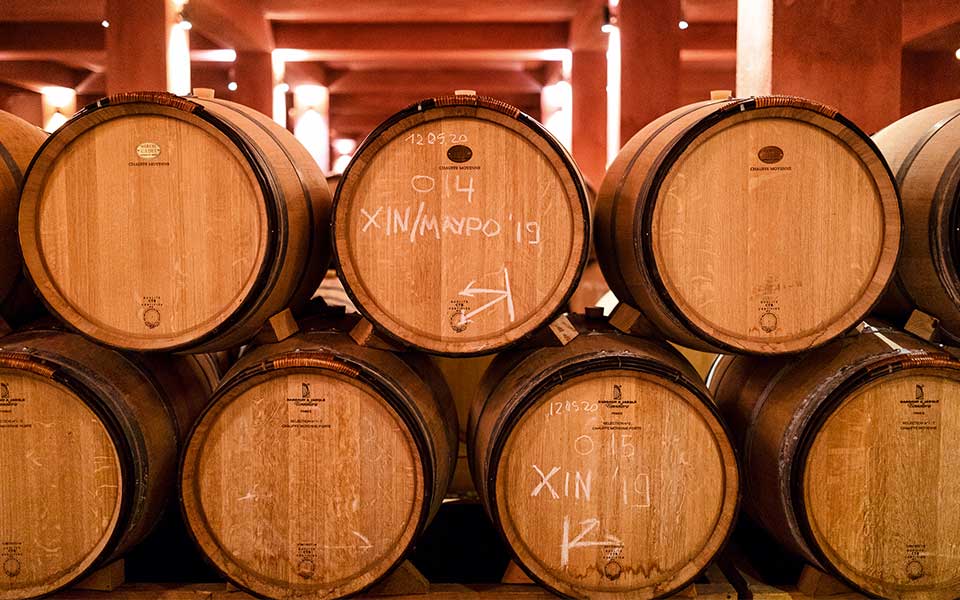
ALPHA Estate's underground cellar.
© Konstantinos Tsakalidis
“Wine is a journey.” Sending this message from Amyntaio a few months ago where she was attending a conference on wine tourism, Deputy Tourism Minister Sofia Zacharaki highlighted that wine tourism is a reliable, alternative option of sustainable development. The wider region is in search of a new financial model, as all coal-fired power plants that currently support the region’s economy are expected to shut down by 2025. The Greek and foreign journalists reporting on the conference were excited to hear Angelos Iatridis, one of the two owners of ALPHA ESTATE, announce that they are advising the Municipality of Amyntaio, in collaboration with the Geotechnical Engineering Department of the National Technical University of Athens, regarding the transformation of an abandoned mine into a vineyard.
“We will develop a form of contract production with wine producers, after offering them training in the enchanting setting of the Alpha Estate winery,” he noted. Founded in 1997 by Angelos Iatridis and Makis Mavridis, the 2,200-square-meter estate is based on a sustainable development model. It operates with an underground irrigation system, often uses a tracking system for strict inspections on the cultivation of each vine – soon, each bottle will have a QR code that links to a video of each field – while it is also in the process of establishing a recycling unit to produce soil enhancers. In addition, the estate is also working on creating an impressive 3,000-square-meter cellar as part of the production of a new semi-sparkling wine, and the construction of a model guesthouse and restaurant.
At Sklithro, Dimitris Kesoglidis operates the Artemis activity center (artemisoe.gr) that offers a plethora of outdoor nature experiences: horse riding, mushroom collecting and spending the night in the forest, among others.
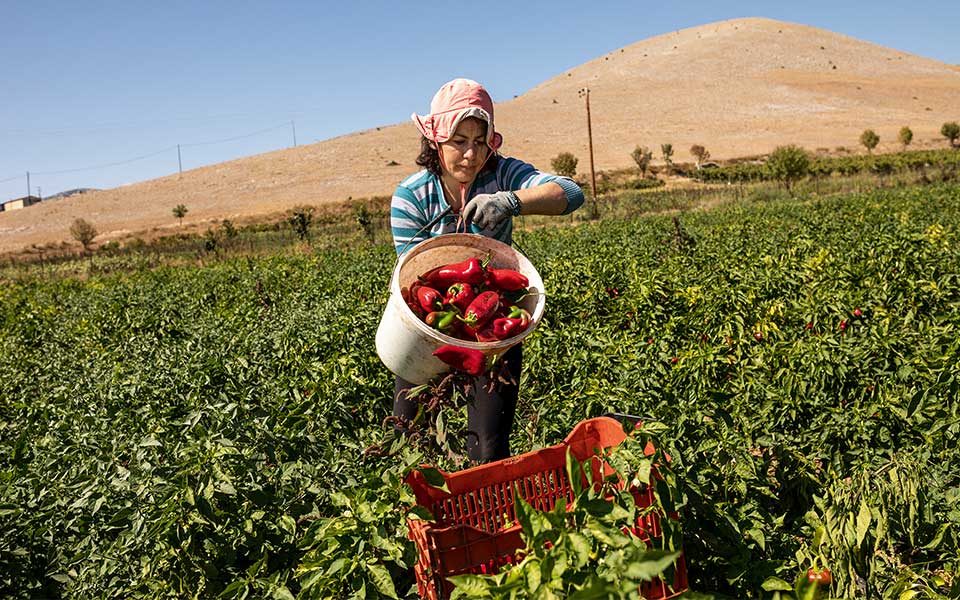
Harvesting peppers at Naoumidis’ farm.
© Konstantinos Tsakalidis
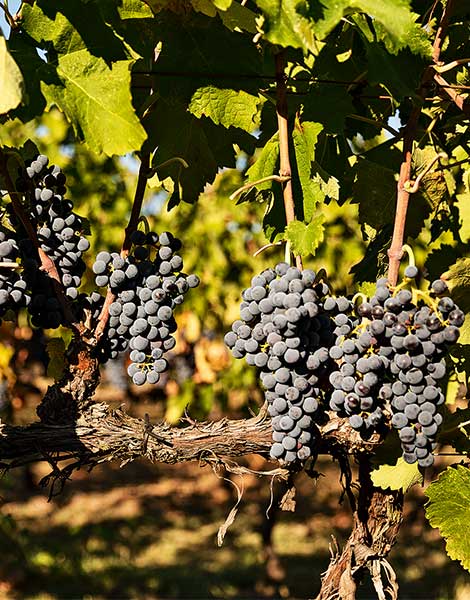
November 1st is International Xinomavro Day.
© Konstantinos Tsakalidis
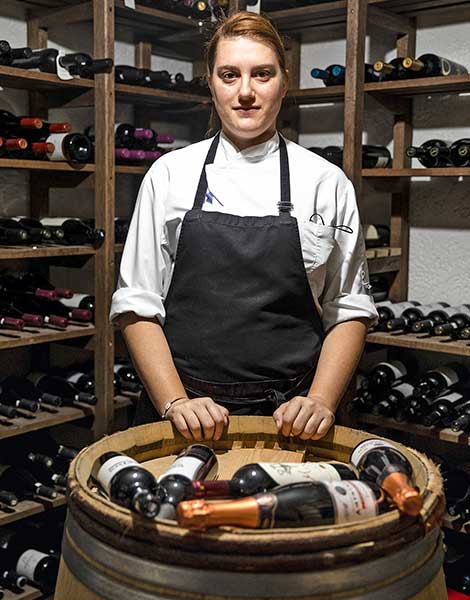
Chef Iliana Kontosorou in the cellar of the restaurant Kontosoros in the village of Xino Nero.
© Konstantinos Tsakalidis
In three villages close to Alpha Estate there are restaurants that promote local gastronomy and the produce of the land. The restaurant Kontosoros is undoubtedly the leader. It’s located in the village of Xino Nero, where the natural sparkling water of the same name is produced. Among the traditional family recipes here, the sout makalo (beef meatballs in a thick saffron roux sauce) is a stand-out. The name comes from the word “maka”, which in the local tongue means “to dunk.” West of Zazari Lake, in Sklithro, the Paspalis family has been running the Thomas restaurant since 1951, serving regional culinary delights. These include multicolored pulses, mushrooms and batzos, a semi-hard white cheese usually made from goat milk.
Towards Vegoritida, a lake with impressive heron colonies, you’ll find Naoumidis, whose menu is based on delicacies from the lake. Try the langoustine in red sauce, and the grilled carp. Chef Angelos Naoumidis also organizes lake excursions (Tel. +30 23860.612.38), which include fishing and cooking. His brother Petros Naoumidis creates special gustatory products at his organic pepper farm, located near the restaurant. Since 2008, he’s been making products using a bilocular pepper, the platika, which has a sweet flavor and an intoxicating aroma. His green pepper pesto and piperokama, a spicy sundried pepper spread, are bestsellers worth stocking up on.
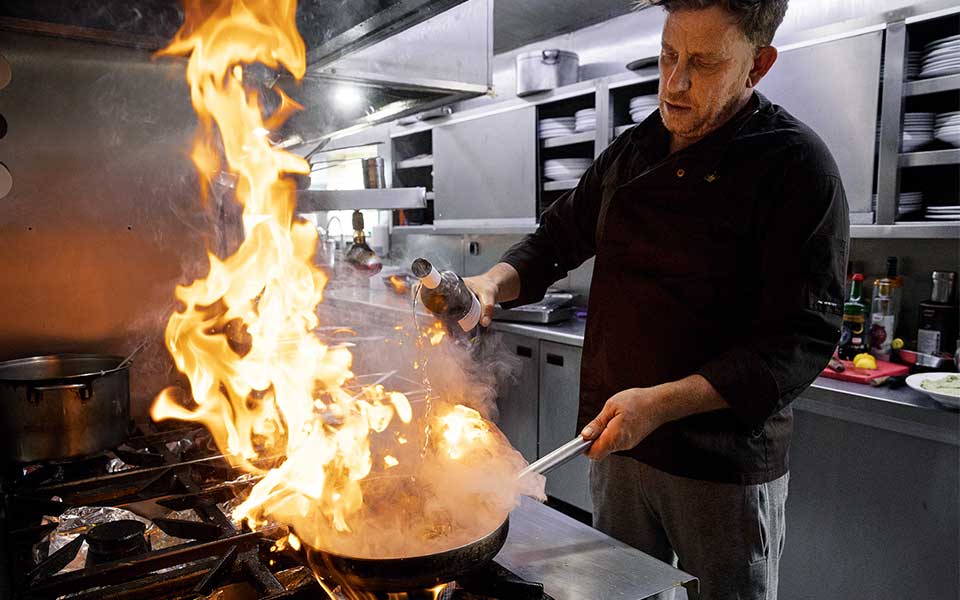
Chef Angelos Naoumidis creates delicious dishes based on fish and shellfish from Vegoritida Lake.
© Konstantinos Tsakalidis
On the other side of Vermio, the PDO wine region of Naoussa, the second largest region producing wine from the Xinomavro grape variety, extends to the east and southeast. Here, the climate is warmer than in Amyntaio. Due to several differences in climate and terroir, the wines here feature different characteristics, despite being from the same variety and cultivated less than 100 kilometers apart. Wines produced in Amyntaio are crispy and fruity, with longer-lasting aromatic qualities, while those from Naoussa have more body and tannins. Today, 22 wineries operate on the outskirts of the city. Some are small family businesses that produce less than 15,000 bottles a year, like Petros Karydas’ winery (Tel. (+30) 697.743.7592) in Ano Gastra. But one of the most important wineries in the country is Kir-Yianni, in Yiannakochori.
Vermio is ideal for hiking excursions. Experienced mountain guide Giorgos Kesaridis (Tel. (+30) 694.8516.659) will help you safely explore the mythical mountain of Semele, mother of Dionysus. The natural pools at Metamorfosi and Gournosovo footbridge are breathtaking.
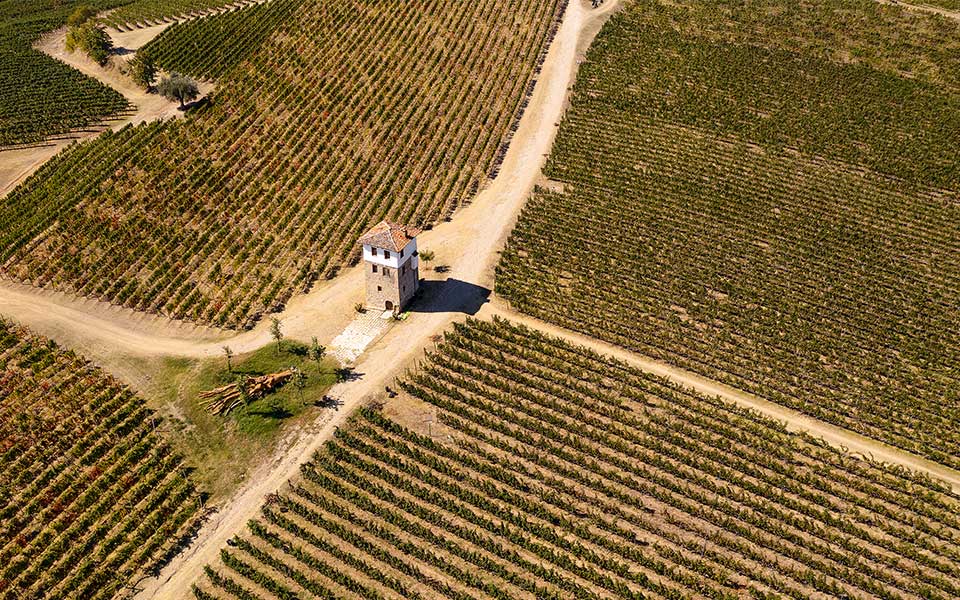
The Kir-Yianni Estate’s iconic tower, which was restored in the 1980s.
© Konstantinos Tsakalidis
Although approximately 90% of Kir-Yianni’s wines are produced at the sister winery in Amyntaio, Stellios Boutaris envisions transforming the landmark winery in the Yiannakochori area into an international destination, with Xinomavro as the star. With a glass of Ramnista, the company’s celebrated Xinomavro, in hand, he guides us around the winery’s new spaces that include an open-plan kitchen, shop and a wine-tasting bar. At the same time in the patio spaces, young children are watching a musical fairytale about the lifecycle of the grapevine. The estate offers visitors a variety of experiences within the winery itself, as well as in the vineyards, such as bicycle rides, picnics and hiking trails.
In Yiannakochori it is also worth visiting organic wine producer Kostas Kelesidis’ estate. In addition to Merchali, a rustic version of Xinomavro, he produces a white wine called Evodeas, which is a blend of Malagousia and Xinomavro. You can enjoy these organic wines with meze at Krasta, a nearby grill house (Tel. (+30) 23320.513.88). Opt for one of the house specials: cow head (with tongue) or pork brisket.
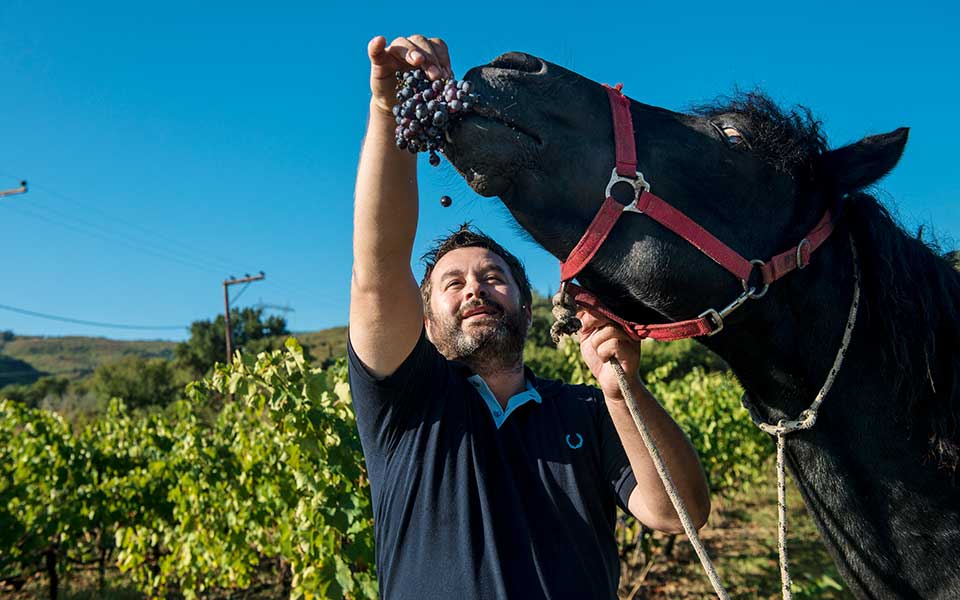
Winemaker Apostolos Thymiopoulos at his biodynamic vineyard in Trilofo in Veria.
© Konstantinos Tsakalidis
In the last 15 years, ambitious new winemakers have added to the long history of wine production in Naoussa, and been recognized for their different approach to winemaking. Kostis Dalamaras (Tel. (+30) 23320.283.21) in Naoussa, and Apostolos Thymiopoulos (thymiopoulosvineyards.gr) in Trilofos in Imathia are characteristic examples. The former is continuing his family tradition, which dates from 1840, but using new methods. In his winery, with its wooden benches, old tools and raki alembic, he proudly serves Paliokalias (when it isn’t sold out), a wine of 100% Xinomavro grapes grown in an old vineyard of the same name. It’s the most famous wine made here, and the estate’s flagship product. The winery of Thymiopoulos is located in the south of the region and produces some of Naoussa’s best-known and most expensive wines (100% Xinomavro). He was one of the first wine producers who attempted to harvest and make wine exclusively from specific separate vineyards. His three favorite vines, Vrana Petra, Aftorizo and Kaiafas, all have different terroirs and grow at different elevations, producing Xinomavro grapes with completely different characteristics, both in appearance and in flavor.
The Arcturos Sanctuary (arcturos.gr) in the picturesque village of Nymfaio is home today to 16 brown bears; you can visit until early January. Tours include a 20-minute seminar on the life of this impressive mammal, and a walk around the park. In Agrapidies, at the Wolf Sanctuary, there are three newly acquired lynxes, a wild animal formerly extinct in Greece. All the animals at Arcturos are rescues.
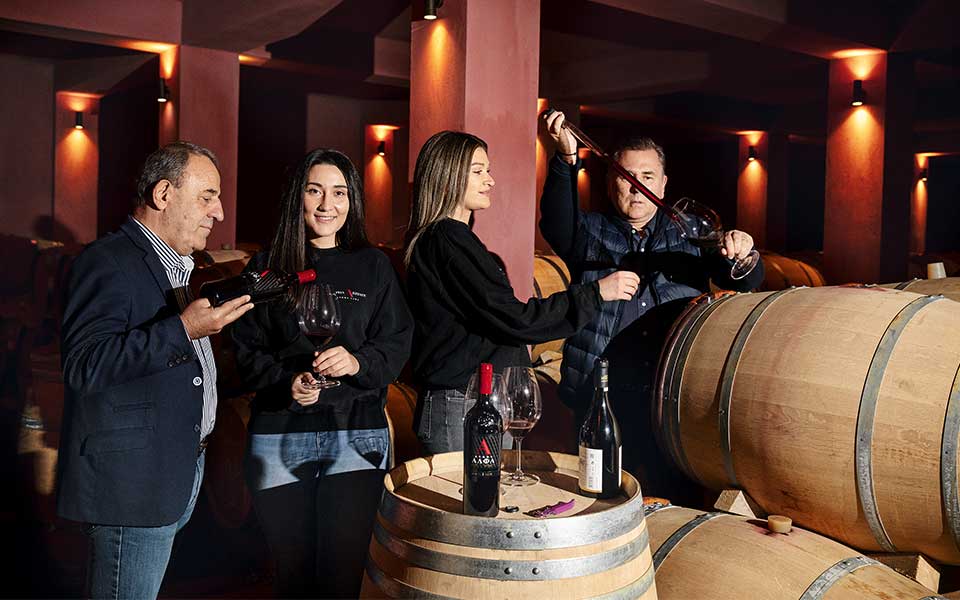
The owners of the Alpha Estate, Makis Mavridis and Angelos Iatridis, try a wine straight from the barrel.
© Konstantinos Tsakalidis
At Naoussa’s restaurants, you can taste the local cuisine and native wines in pairings that seem made in heaven. Spondi (Tel. (+30) 23320.222.33) serves haute cuisine with delicious meze; you must try the gavropsara, pickled eggplant ribbons coated in flour and fried in hot oil. At Oinomageiremata (Tel. (+30) 23320.235.76), a traditional taverna famed for its slow-cooked lamb, ask the owner if you can try his cellar-aged wine.
Of course, Naoussa isn’t just known for its wine; there’s plenty of culture to be had as well. It’s impressive how such a small place has so much history and art. First inhabited during the Roman period, it has a rich industrial past as in the 19th and 20th centuries it was a center for the textile industry. Visit the Genitsaroi and Boules Society (Tel. (+30) 23320.226.71), housed in a traditional listed building in the city center near the watermill, to learn about the famous carnival tradition. You should also drop in at the hotel Palea Poli to admire the paintings of local artist Giorgos Badolas. Wandering the alleys of the town, you may notice that modern art has the power to transform entire neighborhoods: artist Alexandros Tsakonas and other international participants in the Naoussa Urban Art Festival have turned Naoussa into an outdoor art museum, with their works decorating the facades of multiple buildings.
Without noise or concrete, the Old...
Why not try a brief getaway...
From the salt-sprayed islands to the...
Climate change brings water scarcity and...